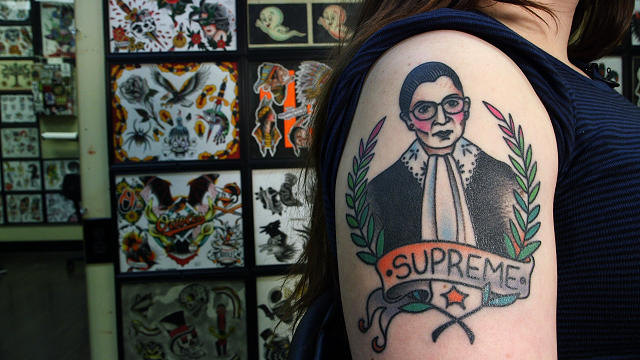Depending on your point of view, Ruth Bader Ginsburg is either the best thing to happen to the Supreme Court or the devil incarnate. A fierce advocate for women’s rights, minority rights, and gay rights, RBG is a sharp-witted, intimidatingly-intelligent lawyer and judge whose writings from the bench have become political crack to a populace starved for intelligent discourse on our political rights. Over the past decade, American culture turned RBG into a pop culture phenomenon, nicknaming her The Notorious RBG and creating viral sketches stating “You can’t spell Truth without Ruth.” Betsy West and Julie Cohen’s documentary RBG works best when they’re celebrating Ruth Bader Ginsburg as a woman, lawyer, judge; it’s less successful when enticing the audience to join in through memeified mindless hero worship.
West and Cohen’s RBG is a hagiographic love letter to Ms. Ginsburg’s life and career bookended by profiles of Ginsburg’s high status as a pop political figure. Using Ms. Ginsburg’s own confirmation hearings as a guiding voice, we’re treated to an all-too-brief overview of her childhood, her long and loving relationship with Martin Ginsburg, and her career fighting for women’s rights in the supreme court with cases dating to the early 1970s. Weaving between life and career, West and Cohen want us to know that Ruth could be a workaholic, but she was also a family-oriented woman. She was all business but also loving and womanly. She could have it all.
If this movie were just 45 minutes of listening to Ms. Ginsburg hold court interspersed with 25 minutes of family footage and 20 minutes of testimonials of her friends and family, RBG would be perfect…unfortunately, West and Cohen want to sell us hard on the pop phenomenon of Ruth Bader Ginsburg, using that examination as an excuse to avoid hearing about any of Ms. Ginsberg’s other opinions. Granted, if it wasn’t for nicknames like The Notorious RBG, RBG wouldn’t have been financed and wouldn’t exist as a documentary – we certainly don’t see theatrical profiles of Sandra Day O’Connor – but, I don’t much care about the creative genius who drew a crown on RBG’s head, and I really really don’t need to watch Kate McKinnon’s one-episode impression of Ms. Ginsburg multiple times over the course of 90 minutes. These dives into shallow ephemera take time away from our opportunity to listen to more recordings of Ruth Bader Ginsburg in court or even home videos with Martin or the grandkids.
When they’re not off on tangents selling you the glories of Ruth’s popularity, West and Cohen are quite talented storytellers, weaving together sound clips, testimonials, home video to form distinct chapters of her life. They have an unerring since of judgement for whose voice matters during each separate story, ranging from Ruth’s grandchildren to her childhood friends to Gloria Steinem and Bill Clinton to NPR’s Nina Totenberg. In these moments of blessed storytelling, RBG is a glorious love letter to the woman and her relationship with Martin that glides over the surface of Ms. Ginsburg’s successes.
Did I say glide? I meant gloss. Ms. Ginsburg was a circuit court judge, but we barely hear of any of those rulings. Even when we get to her stint in the supreme court, a handy graphic tells us that Ms. Ginsburg started as a complete centrist but then had to pull left after W. elected his Republican toadies. West and Cohen do not tell us how or why because any political position outside of women’s rights is out of the scope of this documentary.
There’s a great documentary about Ruth Bader Ginsburg to be made. Hell, there’s a great hagiography of RBG to be made. This is neither, and left me feeling half full.

